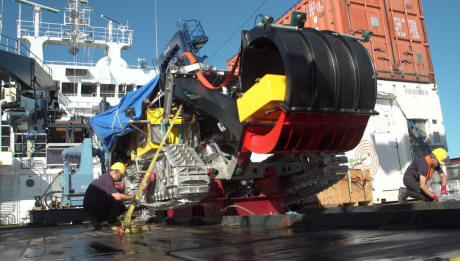National Geographic for Little Kids
|
|
|||
|
|
Subscribe to Wired magazine in Pakistan
|
||
Pakistan's premier website that covers current affairs and news.
MIT Technology Review Subscription in Pakistan
Time magazine home delivery in Pakistan
National Geographic for Little Kids
Electric car future may depend on deep sea mining
The future of electric cars may depend on mining critically important metals on the ocean floor. That's the view of the engineer leading a major European investigation into new sources of key elements.
(Current Affairs Digest by Dr Safdar)

Demand is soaring for the metal cobalt - an essential ingredient in batteries and abundant in rocks on the seabed.
Laurens de Jonge, who's running the EU project, says the transition to electric cars means "we need those resources". He was speaking during a unique set of underwater experiments designed to assess the impact of extracting rocks from the ocean floor.
In calm waters 15km off the coast of Malaga in southern Spain, a prototype mining machine was lowered to the seabed and 'driven' by remote control.
Cameras attached to the Apollo II machine recorded its progress and, crucially, monitored how the aluminium tracks stirred up clouds of sand and silt as they advanced.
Did deep sea mining start with CIA plot?
An array of instruments was positioned nearby to measure how far these clouds were carried on the currents - the risk of seabed mining smothering marine life over a wide area is one of the biggest concerns.
So what are the risks?
No one can be entirely sure, which makes the research off Spain highly relevant.
It's widely accepted that whatever is in the path of the mining machines will be destroyed - there's no argument about that.
But what's uncertain is how far the damage will reach, in particular the size of the plumes of silt and sand churned up and the distance they will travel, potentially endangering marine life far beyond the mining site.
The chief scientist on board, Henko de Stigter of the Dutch marine research institute NIOZ, points out that life in the deep Pacific - where mining is likely to start first - has adapted to the usually "crystal clear conditions".
So for any organisms feeding by filter, waters that are suddenly filled with stirred-up sediment would be threatening. "Many species are unknown or not described, and let alone do we know how they will respond to this activity - we can only estimate."
And Dr de Stigter warned of the danger of doing to the oceans what humanity has done to the land. "With every new human activity it's often difficult to foresee all the consequences of that in the long term. "What is new here is that we are entering an environment that is almost completely untouched."
Could deep sea mining be made less damaging?
Ralf Langeler thinks so. He's the engineer in charge of the Apollo II mining machine and he believes the design will minimise any impacts.
Like Laurens de Jonge, he works for the Dutch marine engineering giant Royal IHC and he says his technology can help reduce the environmental effects.
The machine is meant to cut a very shallow slice into the top 6-10cm of the seabed, lifting the nodules. Its tracks are made with lightweight aluminium to avoid sinking too far into the surface. Silt and sand stirred up by the extraction process should then be channelled into special vents at the rear of the machine and released in a narrow stream, to try to avoid the plume spreading too far.
"We'll always change the environment, that's for sure," Ralf says, "but that's the same with onshore mining and our purpose is to minimise the impact." I ask him if deep sea mining is now a realistic prospect.
"One day it's going to happen, especially with the rising demand for special metals - and they're there on the sea floor."
Who decides if it goes ahead?
Mining in territorial waters can be approved by an individual government.
That happened a decade ago when Papua New Guinea gave the go-ahead to a Canadian company, Nautilus Minerals, to mine gold and copper from hydrothermal vents in the Bismarck Sea. Since then the project has been repeatedly delayed as the company ran short of funds and the prime minister of PNG called for a 10-year moratorium on deep sea mining.
A Nautilus Minerals representative has told me that the company is being restructured and that they remain hopeful of starting to mine. Meanwhile, nearly 30 other ventures are eyeing areas of ocean floor beyond national waters, and these are regulated by a UN body, the International Seabed Authority (ISA).
It has issued licences for exploration and is due next year to publish the rules that would govern future mining.
The EU's Blue Nodules project involves a host of different institutions and countries.
The vessel used for the underwater research off Spain, the Sarmiento de Gamboa, is operated by CSIC, the Spanish National Research Council.
Updated November 14, 2019
At $2M, priciest ever medicine treats fatal genetic disease
Dark Net: the dark side of internet
Subscribe to the New Scientist magazine in Pakistan
Share your views at feedback@newsflash.com.pk
Send your contributions at editor@newsflash.com.pk



